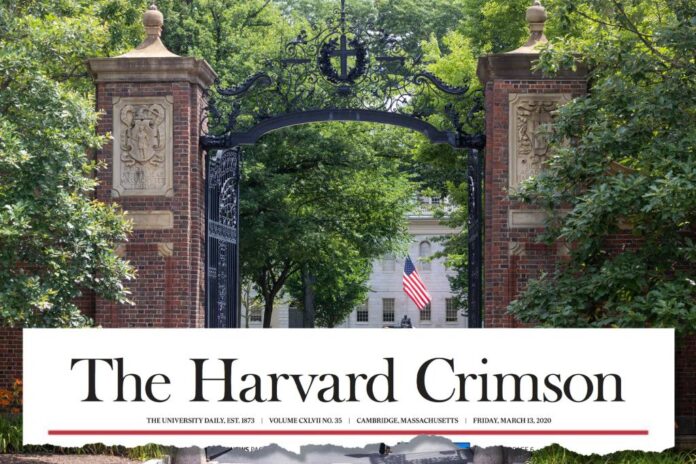Now that the Supreme Court has banned race-based affirmative action, Harvard University’s admissions office has come up with a creative work-around: asking more questions about students’ backgrounds on their applications.
But now the school newspaper’s editorial board has suggested the new essay prompts — which are designed to diversify the student body — are racist.
A September 12 Harvard Crimson editorial board op-ed argued that imposing word limits and asking students about intellectual experiences “has a disparate impact that falls heaviest on those from marginalized backgrounds.”
And that hot take apparently “represents the majority view of The Crimson Editorial Board” and is “the product of discussions at regular Editorial Board meetings.”
This year, Harvard changed its supplemental questions that accompany a longer 650-word Common Application essay for would-be students.
Rather than write an optional open-ended essay (typically between 500 and 700 words) along with two optional 150-word essays, applicants to Harvard are now required to respond to five prompts in a maximum of 200 words each.

The questions probe into students’ life experiences — asking about extracurricular activities, family responsibilities and employment.
One prompt asks: “Harvard has long recognized the importance of enrolling a diverse student body. How will the life experiences that shape who you are today enable you to contribute to Harvard?”
And yet the editorial board — which champions diversity — says they “mourn the loss of Harvard’s old application.”
The “foremost concern” they set forth: “How can students reasonably condense discussions about formative life experiences and their identities into 200 words or less?”

The Crimson board declares that “learning to package yourself within a shorter amount of space is a product of advanced education” and suggests longer essays to “more equitably allow applicants to discuss their experiences in full.”
Not only do they take issue with the supposedly oppressive word limits — but they have a problem with asking potential Harvard students about their intellectual endeavors.
One prompt of particular concern: “Briefly describe an intellectual experience that was important to you.”
The board argues that “this question seemingly privileges applicants from well-resourced backgrounds” and asks, “In what world is it equitable to have one out of the five required short-answer prompts seemingly cater to those from highly privileged backgrounds?”

So underprivileged students are wordier and lack intellectual pursuits?
The editorial board at arguably the most elite school in the country making this case is tone-deaf, to say the least — especially considering that, according to John Jay College professor Evan Mandery’s 2022 book “Poison Ivy: How Elite Colleges Divide Us,” more Harvard students come from the top 1% of US family income than from the bottom 50.
The optics of a majority opinion piece from such students isn’t the bleeding-heart show of empathy they seem to think it is.
It sounds more like they’re looking down their noses at the rest of society and saying, “You couldn’t possibly write as succinctly as we — let alone have the wealth of intellectual experiences that we have!”
Do they really think that disadvantaged students are unable to pursue intellectual endeavors with the same vigor and and curiosity as anyone else applying to Harvard?

It’s such an extreme take that it’s difficult to imagine this could truly be the majority opinion of the editorial board.
It also begs the question: Do board members feel comfortable dissenting — especially when they might be deemed “insensitive” or accused of defending a “racist” policy if they do so?
It’s long been known that the majority of students — 83% by a recent measure — find it necessary to self-censor their beliefs on campuses across the country. And the state of free speech at Harvard is especially bleak.
A 2023 survey of Harvard students conducted by the Foundation for Individual Rights and Expression found that only 12% of students at Harvard feel very comfortable expressing their views about a controversial topic with other students.
Three-quarters of students are worried about damaging their reputation if someone misconstrues what they say, and 49% say that affirmative action is difficult to discuss on campus.

In that context, I wonder how many students bit their tongues and signed off on that out-of-touch editorial for the sake of going along to get along.
And yet two brave student members of the board had the guts to push back.
Ruby J.J. Huang and Joshua Ochieng, both members of the class of 2024, publicly disagreed in a counter op-ed, arguing that the admissions office is perfectly able to holistically assess a student’s background story with the new prompts and other application materials.
“The Board’s concerns with the length of the essays, albeit well-intentioned, are ultimately misguided,” they declare. “As such, we dissent”

Huang and Ochieng should be celebrated for putting themselves out there, despite a culture of conformity on campus.
Unless more students and faculty feel comfortable challenging prevailing viewpoints in academia, absurd and misguided ideas — all the way up to “word limits are racist” — will go unchecked.



